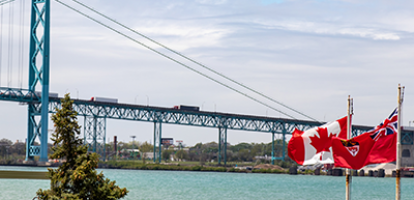As Canada forms its next government, the Prime Minister’s Office will be preparing ministerial mandate letters. In this special Intelligence Memo series, policy experts highlight key challenges and priorities in each minister’s portfolio.
From: Daniel Schwanen
To: The incoming Minister of Trade Diversification
Date: November 18, 2019
Much of Canada’s prosperity derives from international trade and Canada’s interests on that score lie in a secure and predictable framework for business relationships to develop across borders; one that ensures as far as possible that Canada is not discriminated against as a place from which to do business with nationals from any country.
Our trade with the United States remains, in general, more open than that with any other country. However, recent US protectionist actions have made that trade less predictable, and the expected replacement of NAFTA with CUSMA will make it more difficult in some key sectors such as automobiles.
Meanwhile cross-border trade has grown rapidly elsewhere, notably in the Asia-Pacific region, and new agreements have opened up trade with other economies such as the European Union and Japan. An overarching priority will be to accelerate our preparedness to benefit from those markets.
At the same time, one of your key challenges will be to devise, with the Minister of Global Affairs and other cabinet colleagues, the appropriate trade stance in the face of actions by foreign governments that violate the rights of Canadian citizens and potentially threaten Canada’s or global security, or human rights, as described here. As well, other major policy differences between countries, such as approaches to climate change, may lead to the imposition of new barriers to trade. You will then, inevitably, need to think through linkages between trade and other policy areas, moving forward with like-minded countries in areas of common interest, and taking vigorous action to ensure Canadian businesses are not discriminated against by our trading partners.
Accordingly, as you embark on your term as Minister of Trade Diversification, your priorities should be to:
- Work toward the renewal of and strengthening of the multilateral trading system, by helping to break the impasse over the appointment of new WTO Appellate Body members, and fostering productive discussions on the ambit and effectiveness WTO dispute settlement mechanism more generally. As well, seek clarity on the uses and misuses of exemptions from normal trade rules for national security, and support progress on discrete issues that could garner a wide consensus, such as facilitating e-commerce and trade for small businesses.
- Work closely with ministerial colleagues to review domestic barriers that impede Canadian trade success, including barriers to Canada maximizing its competitive advantages, to the marketing of innovative Canadian goods and services, to integration in regional value chains, and to the growth of smaller businesses internationally.
- Expand and consolidate Canada’s network of trade agreements, focusing on like-minded countries and/or areas where competitors are also seeking to expand. Areas of geographical focus should be the future trade relationship with Britain post-Brexit, expansion of the CPTPP, and launching trade negotiations with the Association of Southeast Asian Nations (ASEAN).
- Make headway on a trade agreement with India, in particular by finding ways through which a controlled number of personnel from Indian firms could temporarily work in Canada, in exchange for more opening to Canadian goods, services and investments.
- Work with like-minded economies to integrate existing trade agreements among them into a single tariff-free zone for most goods originating in any of the partners, as I suggested here.
- As a starting point, propose to immediately change the threshold value (typically $1,000) below which costly paperwork to prove a good’s origin is not required at the border, from the value of the shipment to the value of duties otherwise payable, with any partner willing to reciprocate, as suggested here, and facilitate transshipments among these partners.
- To encourage Canadian firms to diversify their markets geographically as a risk-reduction strategy, expand the Canadian Technology Accelerators program abroad to more sectors, including services sectors and natural resources-based sectors, and to additional fast-growing economies.
- Promote the revival of the Trade in Services Agreement, as an exemplar of an agreement that could help Canada, the United States and other advanced economies better use their comparative advantages in many commercial services.
- In a world in which our biggest trading partner and others are turning more toward managed trade in some sectors, for example with respect to public procurement, report on whether Canada’s good faith application of its trade agreements puts its producers at a competitive disadvantage, and if so, consider what remedies are available.
Daniel Schwanen is Vice-President Research at the C.D. Howe Institute.
To send a comment or leave feedback, email us at blog@cdhowe.org.
The views expressed here are those of the author. The C.D. Howe Institute does not take corporate positions on policy matters.





